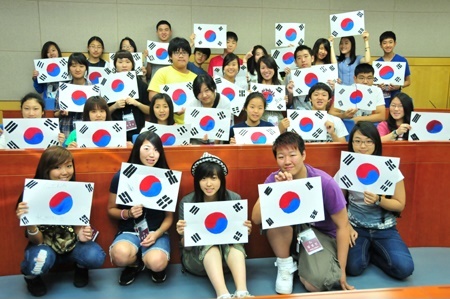- California Assembly OKs highest minimum wage in nation
- S. Korea unveils first graphic cigarette warnings
- US joins with South Korea, Japan in bid to deter North Korea
- LPGA golfer Chun In-gee finally back in action
- S. Korea won’t be top seed in final World Cup qualification round
- US men’s soccer misses 2nd straight Olympics
- US back on track in qualifying with 4-0 win over Guatemala
- High-intensity workout injuries spawn cottage industry
- CDC expands range of Zika mosquitoes into parts of Northeast
- Who knew? ‘The Walking Dead’ is helping families connect
Sending kids to summer school in Korea doing wonders, say parents
By The Korea Times San Francisco staff
Forget Korean language school — how does enrolling your second-generation children in a South Korean school during summer break to teach them the language and culture sound?
It’s the way some Korean American parents are doing it.
One parent, identified only as Kim, 40, of San Jose, said she found success after sending her daughter to Korea for a month-long enrollment in a public middle school.
While most American public schools have about three months of summer break beginning in June, Korean schools do not start until mid-July. Kim took advantage of that one-month overlap, leaving her daughter in the hands of relatives in Korea.
“Here, there are no Korean language schools that offer concentrated classes during summer break,” Kim said. “My solution was sending her to Korea.”
Kim said her daughter came back with an understanding of elderly respect and with a newfound appreciation for Korean food, as well as marked language improvement.
Another parent, Jung, 38, lives in Oakland. She and her children traveled to Korea in summer last year to stay at her parents’ home. The children were enrolled at the local elementary school for a month.
“Their Korean isn’t as good, but they kept up in the classes,” she said. “The school was accommodating, and the Korean kids were nice to my kids and helped increase their sense of pride.”
Jung said she plans to send them back if the opportunity arises.
Parents have other options — homeland experience trips are offered for elementary, middle and high school students annually by the Overseas Koreans Foundation. Korea’s National Institute for International Education offers an educational language experience as well.
The problem is that existing Korean language schools in the U.S. do not offer enough for children to fully learn language and culture, said Kim, another parent who lives in Dublin, California.
“Childrens’ Korean skills don’t improve much learning the language three hours a week on Saturdays,” Kim said. “The kids speak English amongst themselves even at the language schools.”
“If Korean language schools here offered concentrated classes during summer breaks, I would be willing to pay the money to have them there,” she said.

















